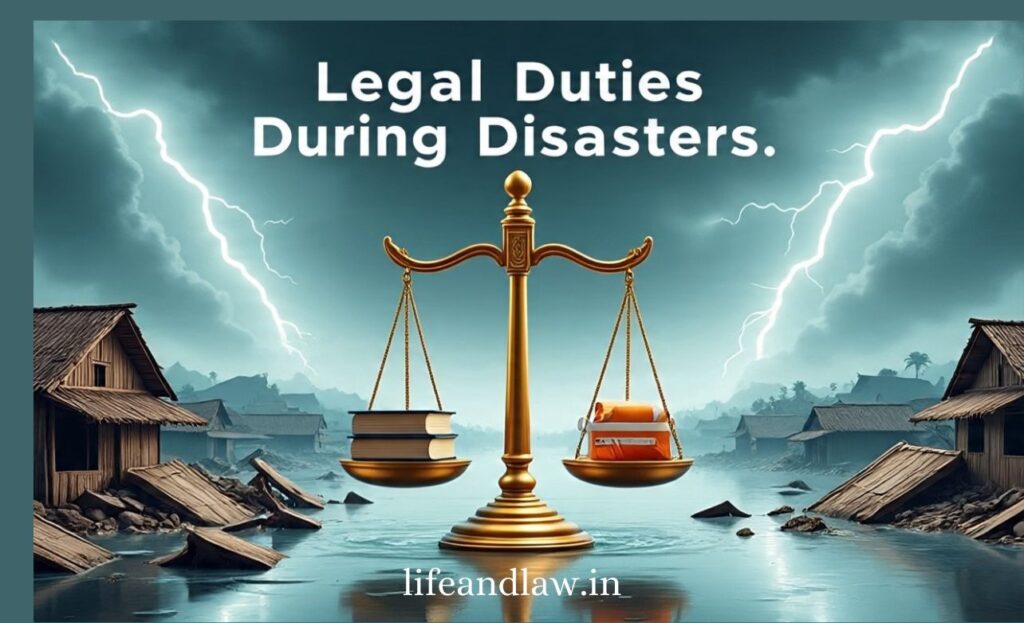Trending

Every year, World Humanitarian Day recognises the bravery and compassion of people who step up during times of disaster. On August 19, we commemorate not only the lives lost in humanitarian efforts, but also the crucial obligations that come with providing relief. Disasters necessitate immediate action, but urgency must not supersede law.
This article investigates the dynamic junction between help and law. It looks at how legal frameworks influence humanitarian operations, ensuring that relief is not only timely and compassionate, but also ethical, safe, and responsible. The purpose is to highlight the legal duties that support efficient catastrophe response.
Disasters, whether natural or man-made, require a rapid response. However, behind every operation is a network of legal obligations that determine who can act, how they act, and what safeguards they have.
At the international level, frameworks such as International Humanitarian Law (IHL) and the Geneva Conventions lay the groundwork for help during armed conflict. The Sendai Framework for Disaster Risk Reduction (2015-2030) emphasises the role of states in natural disaster preparedness and response, both legally and ethically.
At the national level, countries have their own legal instruments, such as India’s Disaster Management Act (2005) and the Federal Emergency Management Agency (FEMA) laws in the United States. These outline the responsibilities of governments, non-governmental organisations (NGOs), and civil society during disasters.
Whether you’re a state official, NGO worker, or volunteer, there are legal duties and limitations that govern how help is distributed – ensuring it reaches those in need while causing no harm or confusion.
The government bears primary legal duty during a calamity. States are constitutionally required to protect citizens, organise rescue efforts, and provide shelter, food, and healthcare. Failure to act, or acting recklessly, might lead to legal repercussions.
NGOs, both local and foreign, must register and adhere to host country rules. They are expected to ensure transparency, protect sovereignty, and adhere to human rights standards. Ethical behaviour is not voluntary; it is legally required.
Private actors and volunteers are also playing increasingly important roles. While many people act selflessly, their activities are limited by the law. Untrained volunteers may do inadvertent injury, therefore the concept of “duty of care” is critical. This legal principle demands individuals and organisations to conduct reasonably and avoid taking activities that could potentially hurt others.
Even with the best intentions, aid programs may encounter severe legal obstacles:
Access restrictions in conflict zones can prohibit aid from reaching civilians, which violates international humanitarian law.
Aid workers frequently encounter visa delays and border restrictions, particularly during political or security crises.
Bureaucracy can impede the speed of help, which contradicts the urgent nature of humanitarian demands.
There is a risk of aid misuse, which includes diversion of supplies, fraud, or corruption. Legal structures must provide for accountability and prosecution if needed.
Another current worry is data protection. The collection of sensitive information, such as names, medical histories, or whereabouts, must adhere to privacy regulations and ethical norms. In many areas, informed consent is required by law, not just as a best practice.
Consider the 2010 Haiti earthquake, when many foreign NGOs arrived with resources, yet ineffective legal coordination resulted in overlaps, delays, and even disagreements over jurisdiction. Legal clarity could have improved efficiency and saved lives.
To be effective, laws must enable, not prevent, humanitarian endeavours. Countries are increasingly recognising the importance of legal preparedness, which involves ensuring that legal systems are ready before calamity strikes.
Some countries have passed Model Emergency Laws, which make it easier to approve international help, accelerate customs clearance for medical supplies, and safeguard humanitarian workers. Legal training for first responders is also gaining traction, ensuring that frontline workers understand the restrictions and protections they operate under.
When laws are clear and responsive, they serve as a powerful weapon rather than a barrier to humanitarian action.
Disasters frequently necessitate cross-border collaboration. The international community has a critical role in establishing legal norms and upholding responsibility.
The United Nations, International Committee of the Red Cross (ICRC), and World Health Organisation (WHO) provide guidance to governments and non-governmental organisations (NGOs) on how to preserve humanitarian law. The International Criminal Court (ICC), while rarely involved in disaster cases, has the authority to hold persons liable for gross negligence or crimes against humanity during an emergency.
As climatic disasters, pandemics, and conflicts spread over the world, the need for harmonised international legal responses grows more critical than ever.
Disasters test not just human resilience, but also the strength and readiness of our legal systems. On this World Humanitarian Day, we honour those who serve on the front lines, but it is also crucial to recognise the legal frameworks that protect both aid workers and the communities they serve.
As the creator of www.asmlegalservices and www.lifeandlaw.in, Adv. Abdul Mulla believes that when help meets law, humanity is not only felt, but also protected. We can ensure that humanitarian relief is ethical, just, and dignified even in times of crisis by raising legal knowledge, providing training, and enacting stronger catastrophe legislation.
Adv. Abdul Mulla (Mob. No. 937 007 2022) is a seasoned legal professional with over 18 years of experience in advocacy, specializing in diverse areas of law, including Real Estate and Property Law, Matrimonial and Divorce Matters, Litigation and Dispute Resolution, and Will and Succession Planning. read more….
Copyright BlazeThemes. 2025